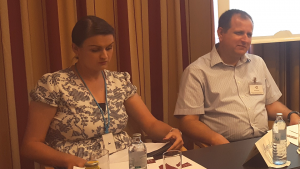
The staff exchange gave CREDI valuable insight into how their Slovenian colleagues support open science initiatives. Here’s what else CREDI’s Amela Kurta and Nermin Oruč learned from the experience.
Sharing expertise and learning from the experiences of others in open science practices which still need to be supported and developed in both countries were the main goals of the CREDI staff visit to ADP. Both institutions host data archives in social sciences, but are as part of their everyday operations, to the different scale included in the broader research context. Members of the Data Archive for Social Sciences (DASS-BiH) team, Amela Kurta and Nermin Oruč visited the Slovenian Social Science Data Archive ADP in May 2022. The visit was part of the secondment that happened from 9th March to 30th June 2022 and included several on-line discussions and other support that ADP team provided to DASS-BiH team via e-mail communication.

During the staff visit, different activities were organised, including a presentation of ADP work, as well as several discussions on common issues in collecting and disseminating data in social sciences. We also organized meetings on knowledge transfer and exchange of good practices on open science with representatives of several relevant organisations from Slovenia, including the Ministry of Education, Science and Sport of the Republic of Slovenia, the journal Javnost, the Public Opinion and Mass Communication Research Centre and the Slovenian OpenAIRE NOAD. We were able to grasp different valuable perspectives on the Slovenian path to establish a more transparent system in supporting open science initiatives. During the meeting with the representatives of the Ministry of Education, Science and Sport of the Republic of Slovenia, we learned about the legal environment and strategies which were adopted to support open data and open access initiatives, such as ADP efforts in the long-term preservation of social science data. We also heard a lot about the experience in establishing OpenAire NOAD in Slovenia and the steps that were required to complete before the NOAD was established. This was beneficial for us since CREDI is a regular member of OpenAire, but our NOAD has not been established. Since ADP is leading the RDA Node in Slovenia within several meetings organised with the ADP team we heard how the relationship is established, which activities are implemented through the Node and how ADP supports Node and vice versa. We are thinking about establishing the RDA Node in Bosnia and Herzegovina, so learning about the benefits, obstacles and workload needed to run the Node was valuable for us. We also learned what is the journal’s perspective in observing the benefits of asking authors to deposit data as prerequires for open science within the meeting with the journal Javnost. During the visit, we also had an opportunity to learn about the ADP workflow procedure and in more detail about the data catalogue which is based on Dataverse. DASS-BiH plans to migrate the data catalogue application by installing Dataverse which will enable a better user experience.
CREDI staff benefited from the secondment by gaining practical insights into the advocacy strategies for the inclusion of data archives in the research landscape of the country and how different components around the data archive help this process. Also, during the secondment period DASS-BiH Workflow procedure was reviewed and revised to reflect new developments in the catalogue technical infrastructure, as well as modified procedures for data deposit and access. As a result of the secondment, CREDI initiated further activities of DASS-BiH, such as the development of the action plan to further advocate our full membership in CESSDA-ERIC, as well as activities related to the education and awareness raising towards more open science practices in Bosnia and Herzegovina. We also revised our workflow procedure and continue working on the development of our data catalogue using Dataverse.
We would like to thank the ADP team for their hospitality and all activities that were organized for us during the visit, as well as for the support provided during the secondment. We learned a lot from their experience, materials and information that the ADP team shared with us. We also would like to acknowledge the support that we received within the RiTrainPlus project that supported our capacity building related to open science practices.
